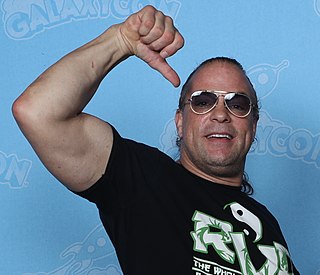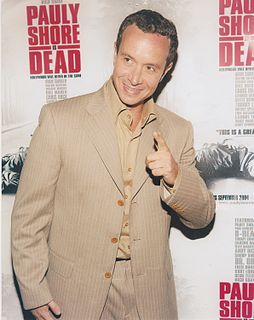A Quote by Nick Cave
It's always a risky business inviting somebody on stage. You never know what they're going to do. I try to avoid letting people join me onstage because it can be very distracting, and overly theatrical.
Related Quotes
As an MC, I come from a background where the onstage experience is freestyle-based: you never know who's going to join you on stage, or what you're gonna do, or how long you can stay on. You kind of lose that, once you get on to recording albums and going on tour. Doing Africa Express has brought me back to that excitement - for the unexpected.
Years ago when I started doing TV and making appearances in big arenas, the place would put security guys up there and I said, "Please don't do that. It's very distracting to see ten cops in front of the stage. Everybody's looking at the officers instead of me. I don't want that." I also found that people will dare to break a barricade. If they have a barricade, somebody will always try to jump over it. I've found that the more open I am, the better.
I've never wanted to be anything other than an actor. I started performing on Broadway when I was 8 years old. My first night on stage, I told my mom, "This is what I want to do. I was always a very out-there kid. The sad thing about acting business is it's so fleeting. If I couldn't do that, I was going to go to school and study law and become a lawyer. But I probably would have been miserable, or they would have had some very theatrical court sessions.
I try my jokes onstage. The only way to really find out if something is going to work is to try it on stage, and I try to be careful and bookend something new with a strong bit before and a strong bit afterwards. But it's fun to run on virgin snow. I like that feeling onstage of creating new footprints and not knowing what's going to happen.
I know I have a caption that I'm going to use when somebody tells me something I've never heard before. It's very rarely a thought, a philosophy, when somebody says, 'Oh, I don't like cheese' or 'Oh, I think the government should be overthrown,' because so many people share these thoughts. But what people don't share is stories.
And, I know the sense of helplessness that people feel. I know the urge to arm yourself because that's what I did. I was trained in firearms. I'd walk to the hospital when my husband was sick. I carried a concealed weapon. I made the determination that if somebody was going to try to take me out, I was going to take them with me.
Onstage it was always comfortable for me because that's where I felt at home. Offstage it was a different situation. I was still shy offstage and unfortunately, my shyness and my inability to communicate and really have great conversations or be part of the gang - in inverted commas - led me to the drug addiction, which, you know, blighted my life for 16 years because I thought by doing that it would make me join in.
When you're onstage, it's important to try and feel some type of therapy in getting the material out, because then you don't leave the stage so tired. If you're onstage and you're doing the same routine over and over, then it gets monotonous. You want to be able to try to get to the truth constantly, and I think the more you do that, the easier it is.
There is a terrible thing that's been happening probably for the last 20 years or so and it's called the music business. And music isn't really business; it's work and you got to pay and you've got to buy your guitar or go into the studio. So there is a business side but when people say, "I'm going into the music business," it's not. It's about expression. It's about creativity. You don't join music, in my mind, to make money. You join it because it's in you; it's in your blood stream.
The thing is, to try to talk about a performance that will never be seen again, that was only lived by the people there, it's kind of like telling somebody about your dream. You know if they love you they'll listen and smile, but they can't really get it, so there is a certain infinite quality to film that is nice. You do the work and you know it's always going to be there. The flip side is if you do bad work it's always going to be there.



































